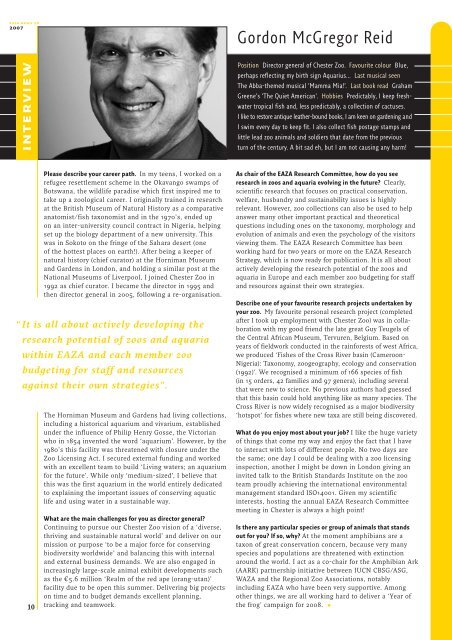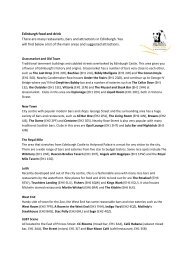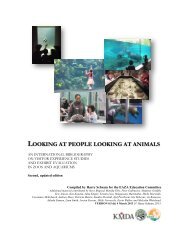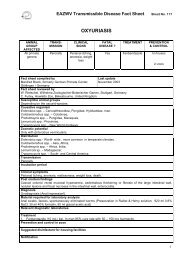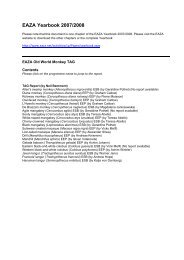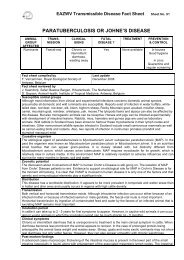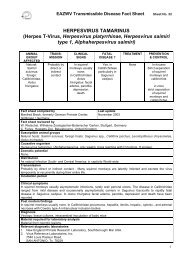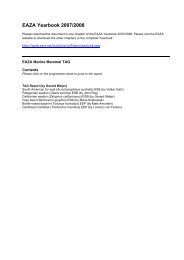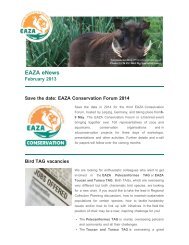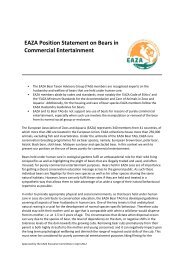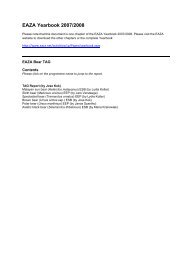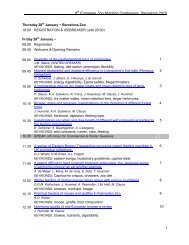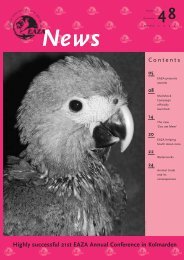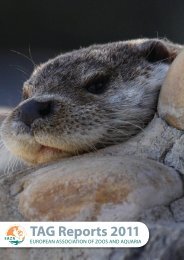EAZA News 58-9 - European Association of Zoos and Aquaria
EAZA News 58-9 - European Association of Zoos and Aquaria
EAZA News 58-9 - European Association of Zoos and Aquaria
Create successful ePaper yourself
Turn your PDF publications into a flip-book with our unique Google optimized e-Paper software.
eaza news <strong>58</strong><br />
2007<br />
interview<br />
Please describe your career path. In my teens, I worked on a<br />
refugee resettlement scheme in the Okavango swamps <strong>of</strong><br />
Botswana, the wildlife paradise which first inspired me to<br />
take up a zoological career. I originally trained in research<br />
at the British Museum <strong>of</strong> Natural History as a comparative<br />
anatomist/fish taxonomist <strong>and</strong> in the 1970’s, ended up<br />
on an inter-university council contract in Nigeria, helping<br />
set up the biology department <strong>of</strong> a new university. This<br />
was in Sokoto on the fringe <strong>of</strong> the Sahara desert (one<br />
<strong>of</strong> the hottest places on earth!). After being a keeper <strong>of</strong><br />
natural history (chief curator) at the Horniman Museum<br />
<strong>and</strong> Gardens in London, <strong>and</strong> holding a similar post at the<br />
National Museums <strong>of</strong> Liverpool, I joined Chester Zoo in<br />
1992 as chief curator. I became the director in 1995 <strong>and</strong><br />
then director general in 2005, following a re-organisation.<br />
“<br />
It is all about actively developing the<br />
research potential <strong>of</strong> zoos <strong>and</strong> aquaria<br />
within <strong>EAZA</strong> <strong>and</strong> each member zoo<br />
budgeting for staff <strong>and</strong> resources<br />
against their own strategies”.<br />
10<br />
The Horniman Museum <strong>and</strong> Gardens had living collections,<br />
including a historical aquarium <strong>and</strong> vivarium, established<br />
under the influence <strong>of</strong> Philip Henry Gosse, the Victorian<br />
who in 1854 invented the word ‘aquarium’. However, by the<br />
1980’s this facility was threatened with closure under the<br />
Zoo Licensing Act. I secured external funding <strong>and</strong> worked<br />
with an excellent team to build ‘Living waters; an aquarium<br />
for the future’. While only ‘medium-sized’, I believe that<br />
this was the first aquarium in the world entirely dedicated<br />
to explaining the important issues <strong>of</strong> conserving aquatic<br />
life <strong>and</strong> using water in a sustainable way.<br />
What are the main challenges for you as director general?<br />
Continuing to pursue our Chester Zoo vision <strong>of</strong> a ‘diverse,<br />
thriving <strong>and</strong> sustainable natural world’ <strong>and</strong> deliver on our<br />
mission or purpose ‘to be a major force for conserving<br />
biodiversity worldwide’ <strong>and</strong> balancing this with internal<br />
<strong>and</strong> external business dem<strong>and</strong>s. We are also engaged in<br />
increasingly large-scale animal exhibit developments such<br />
as the €5.6 million ‘Realm <strong>of</strong> the red ape (orang-utan)’<br />
facility due to be open this summer. Delivering big projects<br />
on time <strong>and</strong> to budget dem<strong>and</strong>s excellent planning,<br />
tracking <strong>and</strong> teamwork.<br />
Gordon McGregor Reid<br />
Position Director general <strong>of</strong> Chester Zoo. Favourite colour Blue,<br />
perhaps reflecting my birth sign Aquarius… Last musical seen<br />
The Abba-themed musical ‘Mamma Mia!’. Last book read Graham<br />
Greene’s ‘The Quiet American’. Hobbies Predictably, I keep freshwater<br />
tropical fish <strong>and</strong>, less predictably, a collection <strong>of</strong> cactuses.<br />
I like to restore antique leather-bound books, I am keen on gardening <strong>and</strong><br />
I swim every day to keep fit. I also collect fish postage stamps <strong>and</strong><br />
little lead zoo animals <strong>and</strong> soldiers that date from the previous<br />
turn <strong>of</strong> the century. A bit sad eh, but I am not causing any harm!<br />
As chair <strong>of</strong> the <strong>EAZA</strong> Research Committee, how do you see<br />
research in zoos <strong>and</strong> aquaria evolving in the future? Clearly,<br />
scientific research that focuses on practical conservation,<br />
welfare, husb<strong>and</strong>ry <strong>and</strong> sustainability issues is highly<br />
relevant. However, zoo collections can also be used to help<br />
answer many other important practical <strong>and</strong> theoretical<br />
questions including ones on the taxonomy, morphology <strong>and</strong><br />
evolution <strong>of</strong> animals <strong>and</strong> even the psychology <strong>of</strong> the visitors<br />
viewing them. The <strong>EAZA</strong> Research Committee has been<br />
working hard for two years or more on the <strong>EAZA</strong> Research<br />
Strategy, which is now ready for publication. It is all about<br />
actively developing the research potential <strong>of</strong> the zoos <strong>and</strong><br />
aquaria in Europe <strong>and</strong> each member zoo budgeting for staff<br />
<strong>and</strong> resources against their own strategies.<br />
Describe one <strong>of</strong> your favourite research projects undertaken by<br />
your zoo. My favourite personal research project (completed<br />
after I took up employment with Chester Zoo) was in collaboration<br />
with my good friend the late great Guy Teugels <strong>of</strong><br />
the Central African Museum, Tervuren, Belgium. Based on<br />
years <strong>of</strong> fieldwork conducted in the rainforests <strong>of</strong> west Africa,<br />
we produced ‘Fishes <strong>of</strong> the Cross River basin (Cameroon-<br />
Nigeria): Taxonomy, zoogeography, ecology <strong>and</strong> conservation<br />
(1992)’. We recognised a minimum <strong>of</strong> 166 species <strong>of</strong> fish<br />
(in 15 orders, 42 families <strong>and</strong> 97 genera), including several<br />
that were new to science. No previous authors had guessed<br />
that this basin could hold anything like as many species. The<br />
Cross River is now widely recognised as a major biodiversity<br />
‘hotspot’ for fishes where new taxa are still being discovered.<br />
What do you enjoy most about your job? I like the huge variety<br />
<strong>of</strong> things that come my way <strong>and</strong> enjoy the fact that I have<br />
to interact with lots <strong>of</strong> different people. No two days are<br />
the same; one day I could be dealing with a zoo licensing<br />
inspection, another I might be down in London giving an<br />
invited talk to the British St<strong>and</strong>ards Institute on the zoo<br />
team proudly achieving the international environmental<br />
management st<strong>and</strong>ard ISO14001. Given my scientific<br />
interests, hosting the annual <strong>EAZA</strong> Research Committee<br />
meeting in Chester is always a high point!<br />
Is there any particular species or group <strong>of</strong> animals that st<strong>and</strong>s<br />
out for you? If so, why? At the moment amphibians are a<br />
taxon <strong>of</strong> great conservation concern, because very many<br />
species <strong>and</strong> populations are threatened with extinction<br />
around the world. I act as a co-chair for the Amphibian Ark<br />
(AARK) partnership initiative between IUCN CBSG/ASG,<br />
WAZA <strong>and</strong> the Regional Zoo <strong>Association</strong>s, notably<br />
including <strong>EAZA</strong> who have been very supportive. Among<br />
other things, we are all working hard to deliver a ‘Year <strong>of</strong><br />
the frog’ campaign for 2008. •


